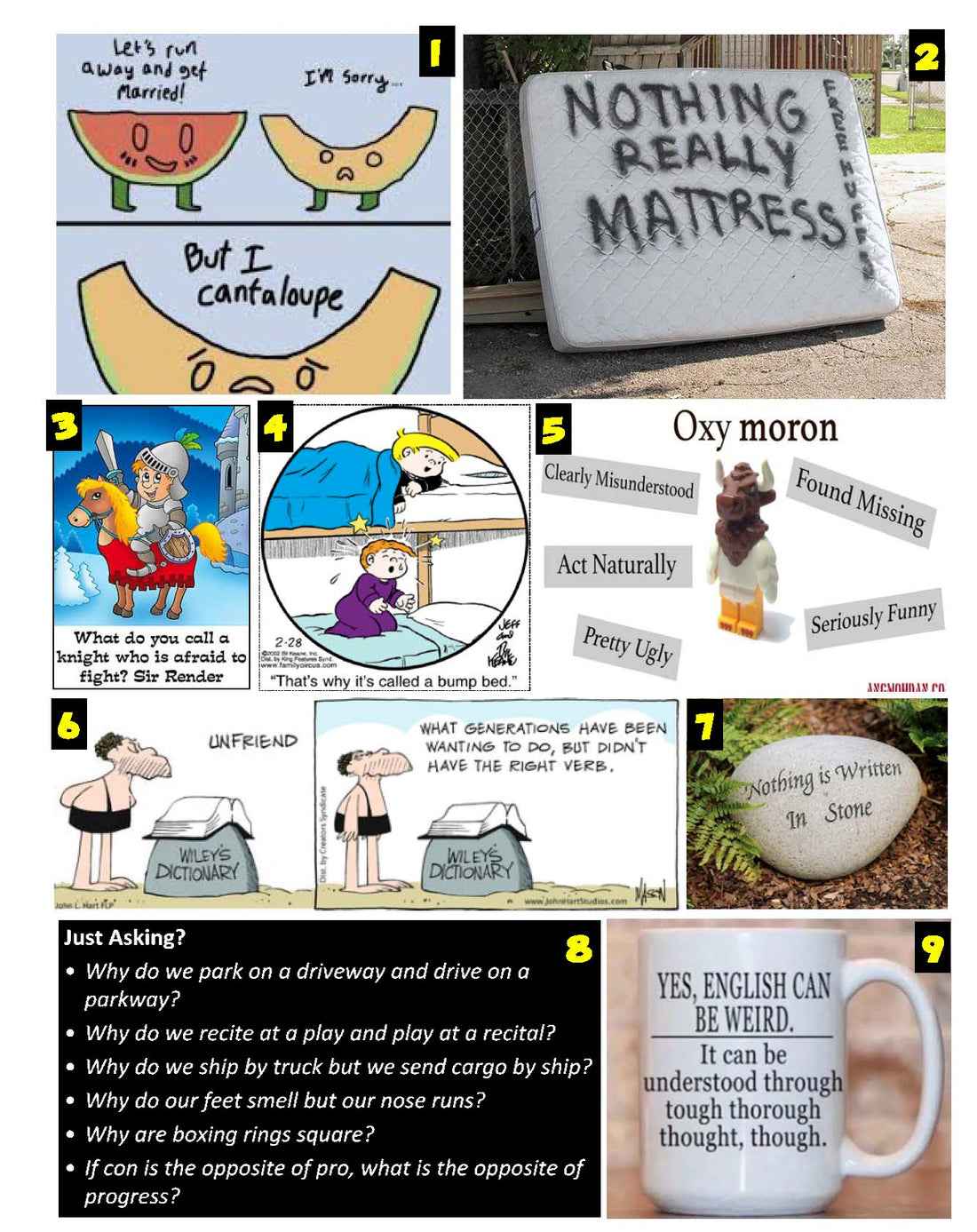Make English Teaching/Learning Work by Having Fun
A major principle of language and content instruction—including successful vocabulary development—is that it has to involve teachers and students to succeed. And an important component of involvement in education is fun.
So . . . just so you can have some right away, here are some Types of Verbal Humor.
Which of these language-based puns, riddles, malapropisms, daffynitions, oxymorons, confusing spellings, and inconsistencies make you laugh—or at least evoke a smile? Why? (There are explanations below).

Once, when we were giving a professional workshop on “Using Humor in the ESL Classroom,” an attendee complained that we were simply not funny—and needed a serious course in “Stand-Up Comedy.” Of course, experts like those at the NEA (National Education Association) agree with us that, “Laughter has the power to fuel engagement and help students learn.” Even so, their article on Using Humor in the Classroom lacked hilarity, too. O.K., so not every educator or scholar is a natural entertainer.
Crushed as we were by the criticism, we decided that what we could do was draw out others’ sense of humor, thereby engaging people, activating learning, easing tension, increasing creativity, firing up brains, and strengthening memory. So what if we bombed in a one-time routine? What’s significant about “Making Teaching/Learning Work by Having Fun” is what we can do with vocabulary in language and content education.
So. . . whether or not you or your students still have hopes of “making it in comedy,” the following suggestions for engaging and empowering learners aren’t designed, intended, or meant to be funny. Still, we hope you’ll enjoy them.
Teach the Subject of Humor Directly: Explore What Makes a Joke Funny
 The ability to crack a joke, get its point, jest, banter, and be witty is closely tied to culture—not only across political or ethnic boundaries, but also various age and social groups. So at any event where people come together, it’s impossible to predict what everyone will find funny. Newcomers to American culture may need the kind of “coaching” offered by Elizabeth Claire’s classic text What’s So Funny? An International Student’s Introduction to American Humor. In it, she invites users to “Laugh While You Learn” about universal and culture-bound elements of humor.
The ability to crack a joke, get its point, jest, banter, and be witty is closely tied to culture—not only across political or ethnic boundaries, but also various age and social groups. So at any event where people come together, it’s impossible to predict what everyone will find funny. Newcomers to American culture may need the kind of “coaching” offered by Elizabeth Claire’s classic text What’s So Funny? An International Student’s Introduction to American Humor. In it, she invites users to “Laugh While You Learn” about universal and culture-bound elements of humor.
For samples and exercises on “conventional” North American humor, take a jab at Part 6 of What’s the Point? The Point of Humor (Comic Strips, Anecdotes, & Jokes). You’ll learn what makes a joke funny (surprise, unexpected connections, illogical reasoning, exaggeration. repetition, relevance to people’s lives, etc.). You’ll put panels of strip stories in order and choose the point of their humor. You’ll get and explain the punch line of funny stories and anecdotes and tell some of your own.
And how do you react to formula jokes, riddles, puns, “daffynitions,” silly questions, 2-line conversations, and quips? Compare your interpretations of these gags with those in the attached Answer Key. Then entertain others with your growing sense of humor about creative vocabulary use.
Want to try your talent at telling funny stories or jokes to an audience? Follow steps in an oral-skills text called Speaking: Part 6: Narration (Fiction Stories = Anecdotes & Jokes). Get tips on storytelling, hear and get the point of some old jokes, retell narratives in “the Game of Gossip,” and laugh at others’ “performances.” Finally, take on the microphone yourself.
Of course, you can also survey Types of Verbal Humor by reading online examples, downloading, and getting the point of their unique features. And as you become expert at laughing out loud and at amusing a crowd, you might also keep researching the humor of vocabulary.
O.K. So even well-told conventional jokes and proven formulas for humor “get old” after a while. And everyone—even seasoned show-offs—eventually get tired of being “on stage.” Most of the time, most of us would prefer to either “lean back and take it all in” or “do something constructive with our time.”
Anyway, the whole point of engaging with humor is to attract interest so participants can relax, teach and learn effectively, and succeed without stress. Mercifully separate from teacher-centered “entertainment,” here are some ways to “Make English Teaching/Learning Work by Having Fun” that directly motivate and facilitate vocabulary growth.
Engage with the Most Elemental of Subject Matter: People
No matter which stage they are in language or learning development, teachers, helpers, and students are likely to want to exchange information about themselves. And what “vocabulary” evokes more close interest or enthusiasm than people’s names; words and phrases related to their lives and work; descriptions of their interests and passions; statements of their values, opinions, views, ideas, and feelings; and whatever else forms the “core of their being?”
So here are suggestions for interactive activities that are sure to involve people right away, naturally “jump-starting” participation in every session’s language improvement. They’re even likely to elicit stress-reducing humor naturally.
- Want “creative, motivating ways to begin a language course?” Start with the pronunciation and oral-exchange Activities A & B of Greetings & Names: Syllable-Stress Patterns & Asking Names. Continue with a memory-enhancing Activity D: Name Chains. Set the spirit of interactive vocabulary building by using the procedures of Activity I: Introduction & Information Bingo. Finally, look over the names of all the lively ideas in the Table of Contents of this small-format book.
- After scanning the Table of Contents of Speaking: Open-Ended Questions for Social Conversation, review their rationale. Using any of the “35 Beginning (Simplified) Open-Ended Questions” (or queries of your own), follow instructions for one of 8 innovative, sure-to-involve-people games or activities, like “The Interview Circle Game,” “Spontaneous Mini-Speeches,” “Truth or Put-on?” and “The Ungame.” Encourage and improve face-to-face social interaction with a “Conversational Checklist.” Finally, delve into the full 40-page Activity & Idea Book and the 72 “Open-Ended Question Cards” it accompanies.
- For engaging language-learning motivation about as “colorful” as it gets, continue getting everyone to interact and progress by Talking about Anything—with Instructions for Creative, Motivating Skills Activities (for Use with & without 54 Picture-Topic Cards from A to Z). Look at the Topic List + Table of Contents. Absorb the “pedagogic explanation.” Try out five Introductory Activities—before applying these effective concepts to academic oral skills development. See what can be done with illustrated Vocabulary cues. Then get involved with the full 40-page Activity & Idea Book and the 54 “Picture-Topic Cards” it accompanies.



So now that you’re convinced that English Teaching/Learning works best if everyone is involved in having fun, here are only a few of the products that incorporate that philosophy. Enjoy tangling yourself up in them!



For monthly email newsletters with free tips, tools, and resources for English language learners and teachers, sign up here!
About Work/Life English
Work/Life English is an experienced provider of fun, effective English language improvement content that advances the lives of native English and English as a Second Language (ESL) speakers by improving their English competence, comprehension, and communication skills. For more information, visit: www.worklifeenglish.com.


